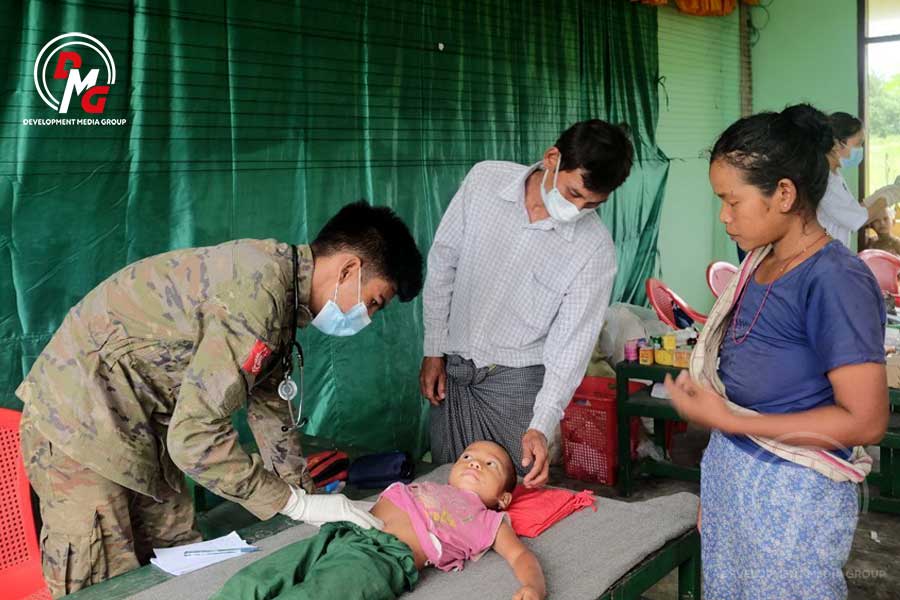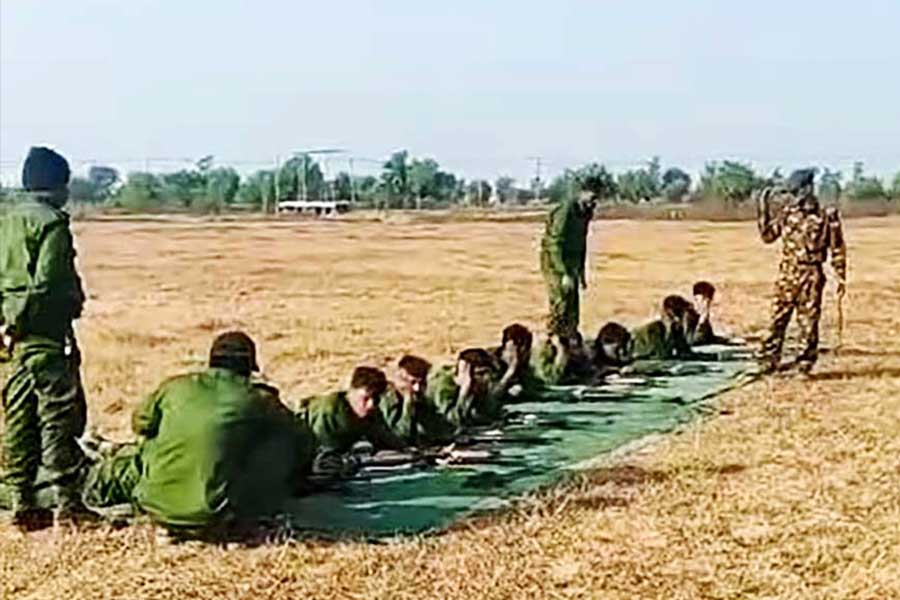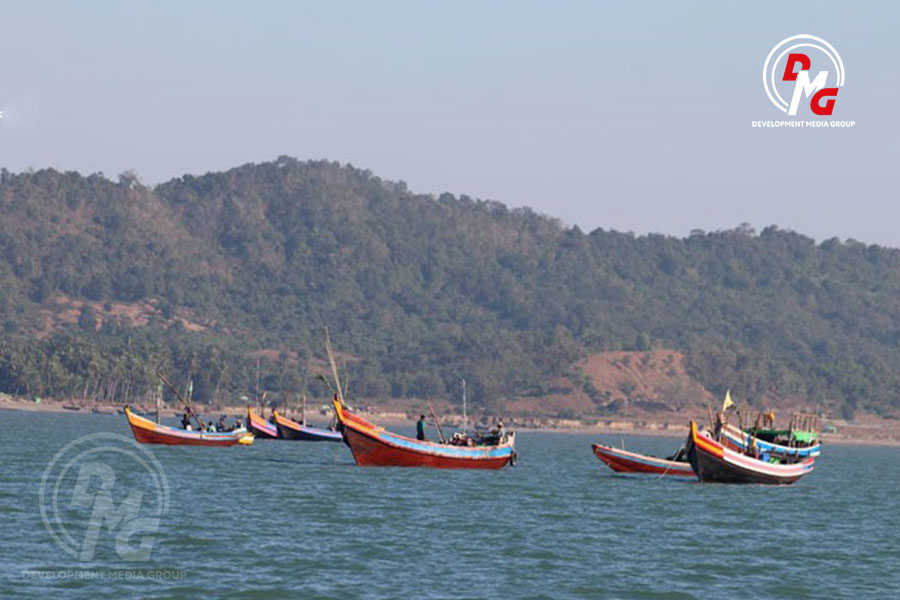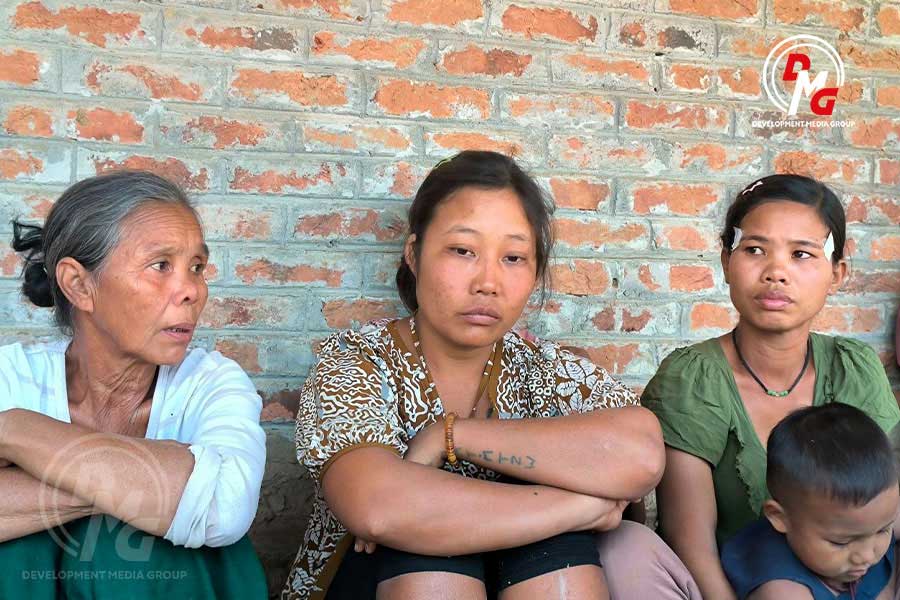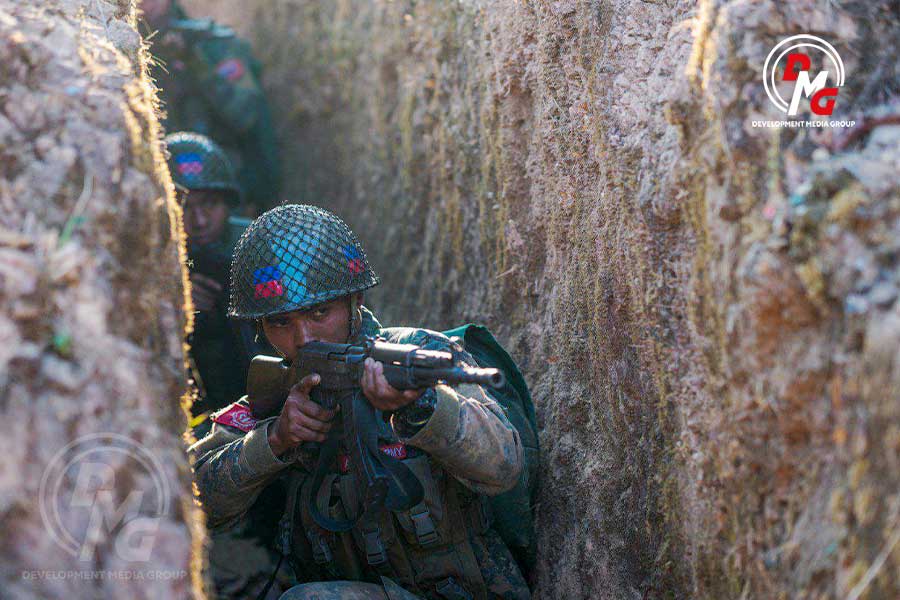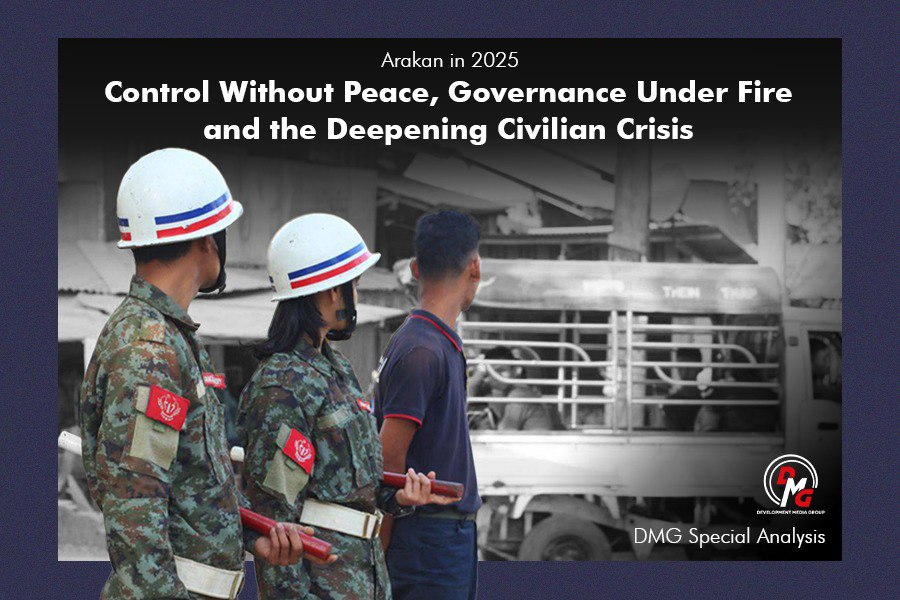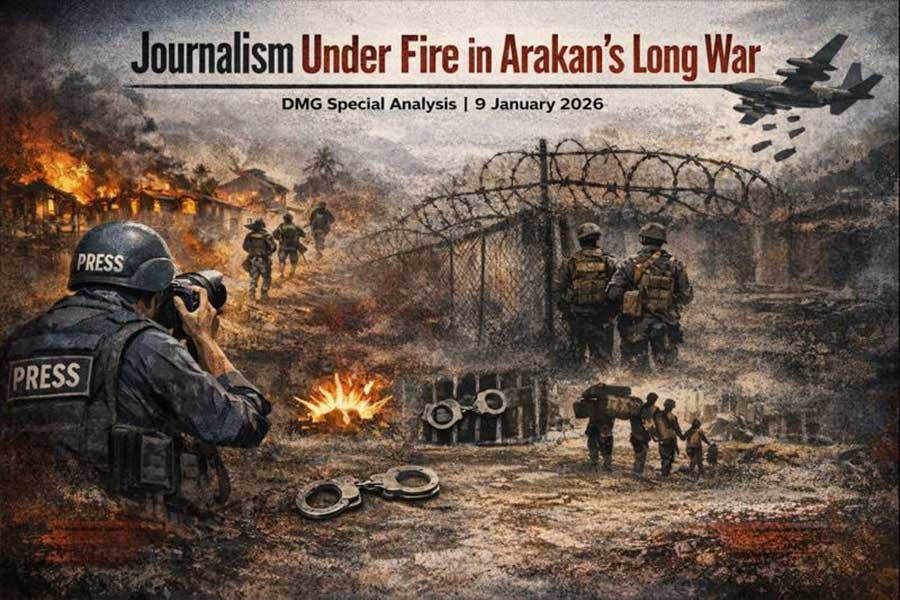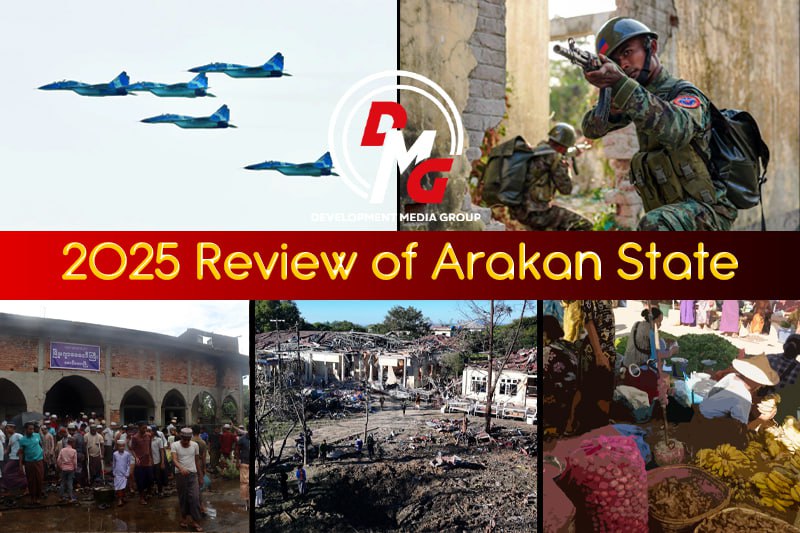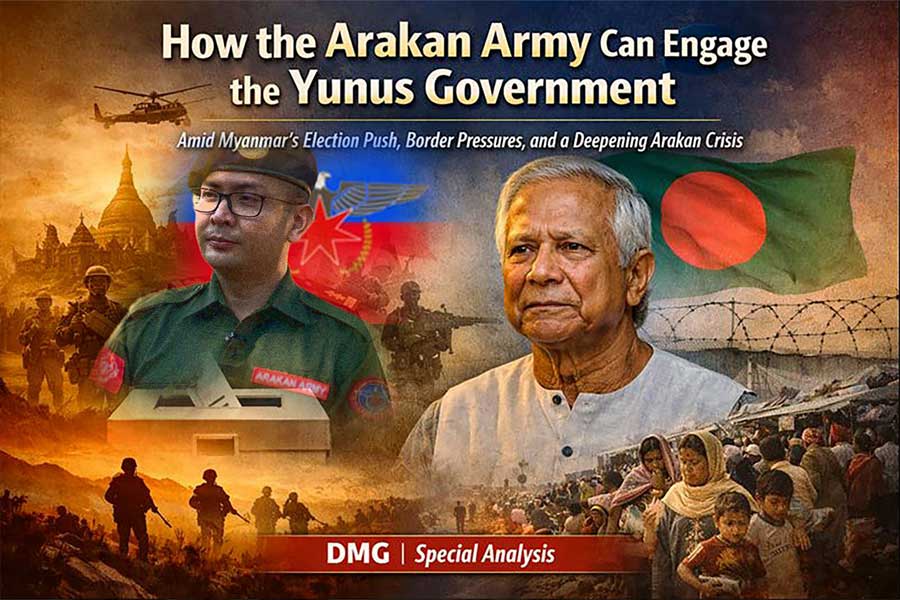- Children in Arakan State face rising cases of pneumonia and flu
- Muslim militiamen flee junta camps in Sittwe amid oppression, discrimination
- Junta navy activities halt fishing in Thandwe
- Junta airstrike kills 21 POWs, family members at Kyauktaw detention centre
- Arakan Army seeks to expand territorial control in Sittwe
Can 2021 Bring Assurances of Peace, Home Return for IDPs?
“I want to stay at home. However, I have not gotten a chance to stay at my home for a long time. I am worried that when [I do return], new clashes will occur,” U Oo Tun Hlaing says pensively.
17 Jan 2021
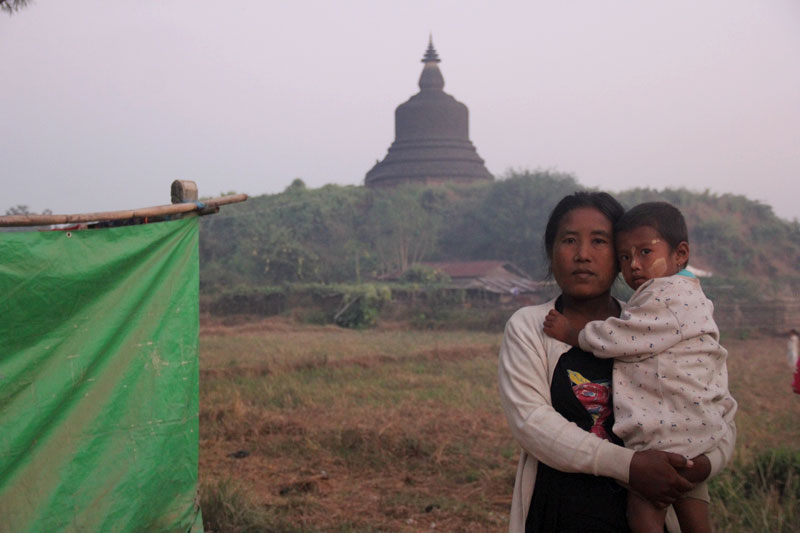
By Aung Htein | DMG
“I want to stay at home. However, I have not gotten a chance to stay at my home for a long time. I am worried that when [I do return], new clashes will occur,” U Oo Tun Hlaing says pensively.
He is sitting outside the door to his hut, staring off into the distance. The tiny, single-room hut has bamboo flooring and a roof made of nipa palm leaves, and inside U Oo Tun Hlaing’s wife breastfeeds their 1-year-old son.
“I have to take refuge at the camp because there is no guarantee for security in my village,” he said, looking at his 9-year-old son, who is playing near the hut with seemingly not a care in the world.
U Oo Tun Haling and his family are from Nyaung Bin Hla village in Rathedaung Township, where the Tatmadaw and Arakan Army have fought, fiercely at times, over the past two years. For the moment, they are sheltering at an IDP camp within the compound of Shwe Parami Monastery in Rathedaung town. More than 1,000 IDPs have been living there for more than a year.
But toward the end of last year, the warring parties in Arakan State — the Myanmar military and the Arakan Army — began a dialogue in hopes of laying out a path toward peace. Since early November, clashes between the two sides have ceased, prompting some IDPs to return to their homes.
A Brief Return Home
About 30 IDP men including U Oo Tun Hlaing returned home to Nyaung Bin Hla. They left their families behind at the IDP camp and returned to the village to check up on their homes, which were left untended for a year, as well as to harvest paddy.
Fighting in the region had ceased, but the détente was based on a tenuous understanding between the two sides, and not on an official ceasefire signed by them. U Oo Tun Hlaing and the other villagers, who knew about the situation through the media, were worried about the possibility of new clashes and returned to the IDP camp at Shwe Parami Monastery.
Even today, the peace reached in November is holding, but there are no guarantees pertaining to security, livelihoods, or related concerns for IDPs who hope to one day return home.
Political analysts, IDPs and other peace process stakeholders have urged a ceasefire agreement to be signed between the government/Tatmadaw and the Arakan Army to sustain the détente between them.
U Maung Maung Soe, a political analyst familiar with ethnic armed groups and their thinking, said bilateral talks are essential to enable the signing of a ceasefire agreement based on mutual understanding and trust, adding that give-and-take between both sides’ leaders is important to keep moving forward.
“The main point is that both sides’ leaders must have understanding and concessions,” he said.
A Peace Talk Committee formed with Tatmadaw lieutenant-generals heads the current discussions with the Arakan Army and the government is not directly involved, so there are difficulties advancing a formal ceasefire, military affairs analysts have said.
‘New Approaches’ to Peace
In a New Year’s Day speech to the nation, State Counsellor Daw Aung San Suu Kyi said her government has prepared “new approaches” to enable armed groups that have yet to sign the Nationwide Ceasefire Agreement (NCA) to participate in the peace process during its next five-year term in office.
The government reportedly sent a draft preliminary ceasefire agreement to the Northern Alliance, a coalition of four ethnic armed groups that includes the Arakan Army, on December 16.
Moreover, earlier this month President’s Office spokesperson U Zaw Htay said the government would discuss preliminary ceasefire prospects with each member of the Northern Alliance.
The government would discuss a wide range of issues including IDPs, regional development, the holding of make-up elections in townships where voting was cancelled on November 8, conflict mitigation, and troop deployments, he said.
But there are also legal obstacles to some of these conversations, with any communications involving the Arakan Army taking place on legally dubious grounds because the ethnic armed group remains designated a terrorist group and unlawful association.
Daw Khin Saw Wai, the Pyithu Hluttaw lawmaker for Rathedaung Township, said the government thus needed to rescind its terrorist declaration of the AA.
“I believe that removing the AA from the list of terrorist groups will go a long way toward establishing mutual trust during discussions,” she said.
Growing Calls for De-Designating
The Arakan National Party (ANP) on January 11 put forward a proposal in the Arakan State legislature urging the Union government to remove the AA from its list of terrorist groups.
U Tun Thar Sein, a state lawmaker for Mrauk-U Township and member of the ANP, submitted the proposal, describing the terrorist designation as “a main impediment” to peace in Arakan State.
U Hla Maung Shwe, a senior consultant for the government’s Peace Commission, said there was precedent for removing names from the terrorist list to further Myanmar’s peace process.
“According to my experience, the U Thein Sein government invited ethnic armed groups [to engage in peace talks] in 2011. And they discussed it until 2015, and the government removed them from the list of terrorist groups three days before signing the NCA,” he said.
Regarding the effort by ANP lawmakers in the state hluttaw to get the AA taken off the terrorist list, National League for Democracy (NLD) spokesperson Dr. Myo Nyunt said it was “a proper act.”
“Their proposal is urging the Union government to do for the situation that which is required in their state. It is a proper act,” he said.
However, the recommendation of the Tatmadaw vis-a-vis the AA would be more determinative of the ethnic armed group’s status, Dr. Myo Nyunt added.
“The Tatmadaw and AA have recently met and discussed. So, the recommendation of the Tatmadaw will be pretty important,” he said.
While much is uncertain for Arakan State in the early days of 2021, there appears to be a growing consensus that rescinding the AA’s terrorist designation is a key to unlocking a more peaceful and prosperous future for all.
“Removing the ULA [United League of Arakan] and AA from the terrorist group list will be the first step for the peace process to be seen in the future,” said U Kyaw Zaw Oo, Arakan State Hluttaw MP for Sittwe.
“Among all obstacles in Arakan State affairs, the AA designation as terrorist should be removed first. From there, situations will follow to advance more steps,” he added.
Until then, more than 190,000 IDPs in the state hope for a concrete ceasefire or other arrangements to more definitively end the war and/or guarantee their security.
IDPs want to return home and be able to do their business, sustain their livelihoods, without concern for their safety. And they are looking to the next NLD government, which will take office in just a few months, to deliver.
For now, U Oo Tun Hlaing and his family spend cold nights in their hut at Shwe Parami Monastery, doing their best to defy the winter winds until they can return to warmer, less drafty lodging.
“Staying at IDP camps is not as good as being at home,” U Oo Tun Hlaing says plaintively. “We want to return home.”




